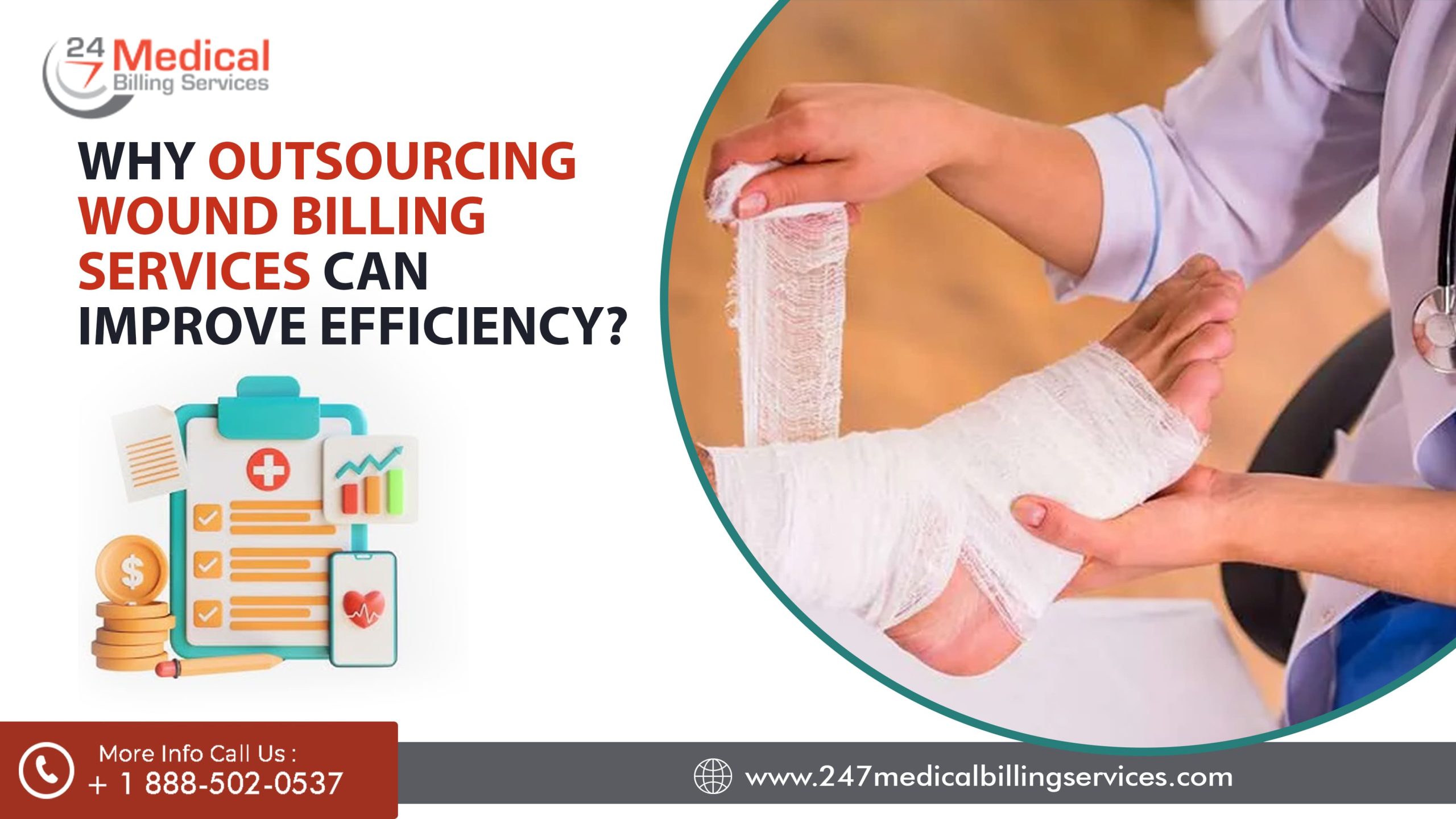
Why Outsourcing Wound Care Billing Services Can Improve Efficiency?
Undoubtedly, the complexities of wound care billing pose a significant challenge for healthcare providers. The intricate details involved in accurate billing, coding, and compliance with ever-changing regulations can be overwhelming, leading to errors, claim denials, and financial instability. As healthcare practices continue to evolve and focus on delivering high-quality patient care, the administrative burden associated with billing can divert valuable time and resources away from their primary mission. Outsourcing wound care billing services has emerged as a viable solution, offering numerous benefits that can enhance efficiency, improve workflow, and optimize profitability, such as:
Benefits of Outsourcing Wound Care Billing
1. Reduced Administrative Burden
Wound care billing is a time-consuming and complex process that requires meticulous attention to detail. It involves documenting and submitting medical invoices for various services, including wound assessment, cleansing, dressing changes, infection control, and other relevant procedures. Thereby, managing this process internally can become overwhelming for healthcare providers, consuming valuable staff time that could be better spent on patient care.
By outsourcing wound care billing services, healthcare providers can alleviate the administrative burden associated with billing and coding. Specialized billing companies have teams of experienced professionals who are well-versed in the intricacies of wound care billing. These experts handle the entire billing process, from claim submission to payment tracking, allowing healthcare providers to focus on what they do best—delivering quality care to their patients. This not only improves staff productivity but also enhances overall patient satisfaction, as providers can dedicate more time and attention to their patients' needs.
2. Access to Expertise
Wound care billing is a specialized field that requires a deep understanding of coding, insurance regulations, and compliance standards. The complexity of wound care billing, in particular, demands a high level of expertise to ensure accuracy and avoid costly errors. Internal billing teams may lack the specialized knowledge needed to deal with the complexities of wound care billing effectively.
Outsourcing wound care billing services provides healthcare providers access to a team of experts with the necessary skills and knowledge to handle even the most complex billing scenarios. These professionals stay up-to-date with the latest coding updates, regulatory changes, and compliance requirements, ensuring that all claims are accurately submitted and processed. This expertise reduces the risk of errors, claim denials, and delayed payments, ultimately improving the practice's financial stability.
3. Improved Workflow Efficiency
Efficiency is a critical factor in the success of any healthcare practice. When billing processes are managed internally, the potential for errors, delays, and inefficiencies increases. Inaccurate coding, incomplete documentation, and missed billing opportunities can result in denied claims, delayed reimbursements, and financial losses. These issues not only affect the practice's revenue but also create additional stress for staff members who must deal with the complexities of billing while managing other responsibilities.
Outsourcing wound care billing services can significantly improve workflow efficiency by streamlining the billing process and reducing the likelihood of errors. Specialized billing companies use advanced technology and software to automate many aspects of the billing process, ensuring that claims are submitted accurately and on time. Additionally, outsourced billing teams work closely with healthcare providers to ensure all necessary documentation is complete and accurate, reducing the risk of errors and claim denials.
4. Cost Savings
One of the most significant advantages of outsourcing wound care billing services is the potential for cost savings. Maintaining an in-house billing team requires substantial investment in training, staffing, infrastructure, and healthcare IT services. Additionally, the costs associated with recruiting, training, and retaining qualified billing professionals can be substantial.
Outsourcing offers a cost-effective alternative to maintaining an in-house billing team. Outsourced billing services typically operate on a fee-based structure, allowing healthcare providers to pay for services per case or per hour. This flexible payment model reduces fixed overhead expenses and eliminates the need for ongoing investments in training and technology. As a result, healthcare providers can allocate their resources more effectively, focusing on areas that directly impact patient care and practice growth.
5. Enhanced Patient Satisfaction
Patient satisfaction is a critical component of a successful healthcare practice. Efficient and accurate billing processes contribute to a positive patient experience by ensuring that billing and payment processes are handled smoothly and transparently. When patients receive clear and accurate billing statements, they are more likely to trust their healthcare provider and feel satisfied with their overall care.
Outsourcing wound care billing services can enhance patient satisfaction by streamlining the billing process and reducing the likelihood of errors. Outsourced billing teams work diligently to ensure all claims are processed accurately and on time, minimizing the risk of billing disputes and delays. Additionally, outsourcing allows healthcare providers to focus more on patient care, building stronger patient relationships, and creating a positive healthcare experience.
6. Improved Revenue Cycle Management
Revenue cycle management is critical to any healthcare practice's financial health. Efficient revenue cycle management ensures that claims are submitted promptly, timely payments are received, and outstanding balances are managed effectively. However, managing the revenue cycle internally can be challenging, particularly for practices with limited resources and expertise.
Outsourcing wound care billing services can improve revenue cycle management by accelerating billing and reducing payment delays. Experienced billing professionals oversee every aspect of the revenue cycle, from claim submission to payment tracking and follow-up. This proactive approach ensures that claims are processed quickly and accurately, optimizing the practice's cash flow and financial planning.
Conclusion
Outsourcing wound care billing services to 24/7 Medical Billing Services offers a comprehensive solution for healthcare providers seeking to improve efficiency, reduce costs, and enhance patient satisfaction. By entrusting billing responsibilities to these specialized professionals, healthcare practices can streamline operations, optimize revenue cycle management, and focus on delivering high-quality patient care. The benefits of outsourcing—reduced administrative burden, access to expertise, improved workflow efficiency, cost savings, enhanced patient satisfaction, and regulatory compliance—make it a strategic choice for any healthcare practice looking to achieve long-term success.


.png)
